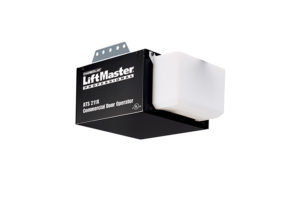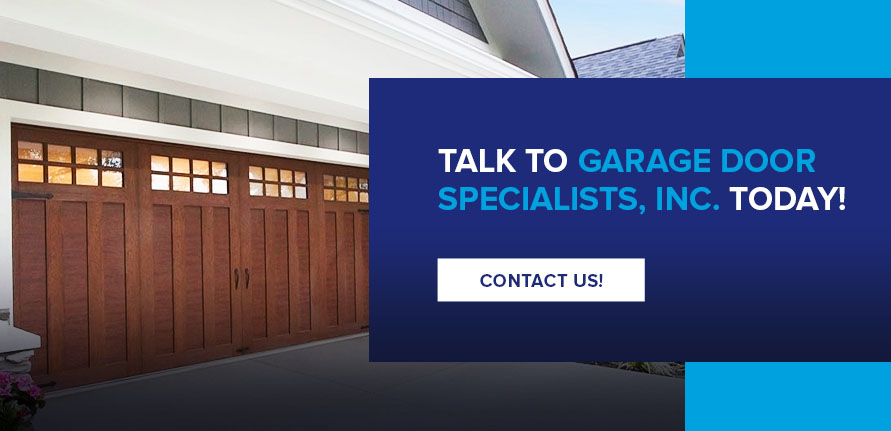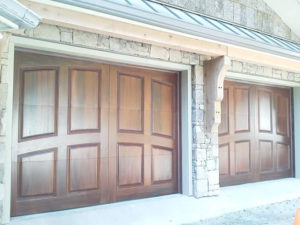Why Your Garage Door Light Won’t Work and How to Fix It
Why Your Garage Door Light Won’t Work and How to Fix It
Garage door malfunctions can happen at any time. Even with top-quality garage door opener brands such as LiftMaster, components can occasionally become jammed or fail to operate normally. One common issue homeowners run into is their LiftMaster garage door light not turning off or turning on. While these problems don’t damage your residential garage door system, they can wear down the light’s battery or cause you to stumble in the dark. However, you can easily fix these issues.
Read on to learn some tips for garage door light troubleshooting. For example, if your garage door light won’t turn on or off, try our solutions listed below.
Why Won’t My Garage Door Opener Light Turn Off?
If you are struggling to shut off your garage door light, there is likely a problem with your door’s motion sensor or light timer. More specifically, if your garage door light stays on, it is probably because of one of the following reasons:
- The motion sensors for the garage door are triggering because of movement. These sensors control the light switch’s automatic on-and-off mechanism.
- Your garage door’s light feature is continually being engaged by something in the doorway zone.
- The light panel switch is on.
In rare cases, a faulty logic board may cause your garage door light to malfunction, which would require professional repair service.
Troubleshooting a Garage Door Light Remaining On
Checking to see why your garage door light won’t go off is a simple process since lights staying on usually stem from the lights settings. You can fix this issue of the light staying on by following these troubleshooting steps or watching this video:
Consult the Manual
Consult your LiftMaster garage door manual to ensure you know how to navigate your garage door’s features properly.
Check the Motion Sensor
Test your motion sensor’s light feature. You can turn it off from your control panel by selecting “Menu” > “Light Settings” > “Automatic Light” > “Motion Sensor,” which will disable the feature. Ensure that nothing passively moving in your garage will set the motion sensor off.
Inspect the Remote Control and Wall Switch
Check to see if your light switch is enabled or if the remote control has light on or off options. If you look at the side panel of the garage door, the light switch is there— if it is in the on position, turn it off.
Examine the Garage Door Opener
Inspect the garage door opener. Look specifically for anything that could obstruct the sensor or set it off in some way.
Check for Obstructions
Search the area for any obstructions by the garage door that may affect the sensors.
Look for Electrical Issues
Sometimes, the door’s wiring is the problem. First, reset your light timer to its lowest setting. Disconnect the power from the unit, and the wiring from the opener. Reconnect the power after one and a half minutes, and the lights should come on.
When to Contact a Professional
If you still are having issues after troubleshooting, aren’t comfortable with repairing the logic board wiring yourself or are experiencing any unusual sounds or behavior from your garage door opener, you need to call a professional for garage door service.
Why Won’t My Garage Door Opener Light Turn On?
If your LiftMaster opener light is not working and you are consistently walking into a dark garage, your light may have one of these common causes of failure:
- Burnt-out light bulb
- Faulty light socket or connections
- Issues with the garage door opener
- Problems with the remote control or wall switch
- Electrical or wiring issues
Troubleshooting a Garage Door Opener Light Failure
When your garage door opener light fails, you should go through the following list to start eliminating possible causes and get to the root of the problem:
- Check the light bulb: First, look for telltale signs the lightbulb is blown, like black marks or loose bits inside it.
- Examine the light socket: If the lightbulb is fine, check the light socket for scorch marks or anything out of the ordinary. Remember to be safe — only look, and don’t touch.
- Inspect the garage door opener: Next, look at the opener itself to see if there are any loose connections or damage.
- Test the wall switch and remote control: After inspecting the opener, conduct on/off tests with the wall switch, and check your manual to see if there are light controls on your remote you can test.
- Search for electrical issues on the property: Turn the power off before working with wiring or electricity. Then, inspect wires that run from the opener and any other exposed electrical parts for damage.
Contact Garage Door Specialists, Inc. Today
If you’re having trouble with a LiftMaster garage door light that won’t turn on or shut off, it’s time to contact the professionals at Garage Door Specialists, Inc. You can feel confident that we’ll respond to your issues quickly.
Wood Garage Doors vs. Steel Garage Doors: Which Is Better for Your Home?
Wood Garage Doors vs. Steel Garage Doors: Which Is Better for Your Home?
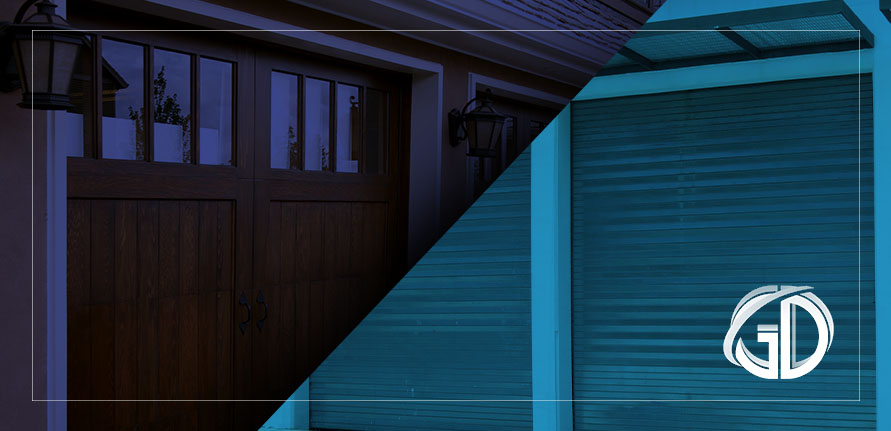
Wood and steel are two of the best materials for a new garage door. They’re long-lasting and stylish and can elevate your home’s exterior. If you’re planning to upgrade your home’s garage door, you might have questions about which material is the right option.
Both choices have pros and cons, but ultimately, the best decision comes down to your personal preferences and priorities. Regardless of which material you choose, upgrading your garage doors can protect your home and increase its curb appeal.
A new garage door is a great investment, and you can enjoy the benefits for years. Use this guide to compare wood vs. steel garage doors so you can make an informed decision.
Pros and Cons of Wood Garage Doors
Many people prefer wooden garage doors because of their high-quality look. They’re beautiful, have a classic style and can elevate your home’s curb appeal. Here are some common pros to choosing a wooden door:
- Traditional style
- Customizable
- Long-lasting
- Insulating properties
- Easy to repair
When you choose a wooden door, the custom options are endless. You can specify window shape and size, panel style, stylistic overlays, hardware and stain color. This product can be designed to complement your home and get the exact look you want.
Wood has low thermal conductivity and does have some natural insulating properties, but is not as insulating as some other materials like steel. When properly maintained, a wooden garage door can last for many years. The longevity of a wood garage door can vary depending on factors such as the type of wood, climate conditions, and proper care and maintenance.
Because they’re such high quality, however, wooden doors do require some upkeep. Here are some of the cons that come with investing in a wooden garage door:
- High comparative cost
- Maintenance needs
- Aging from weather
Wood slightly expands and contracts with changes in weather temperature and humidity. Over time, the finish on wood garage doors may wear off, and you’ll need to reseal them. Because they’re so customizable, wooden garage doors also have a much higher price than steel options.
Depending on your goals, wooden garage doors may be the perfect choice for you.
Pros and Cons of Steel Garage Doors
Steel garage doors have many benefits, but people choose this option mainly for its cost and durability. Here’s a quick list of the top pros for choosing a steel garage door for your home:
- Sleek finish
- Insulation options
- Affordability
- Low maintenance
- Range of colors
- Pattern options
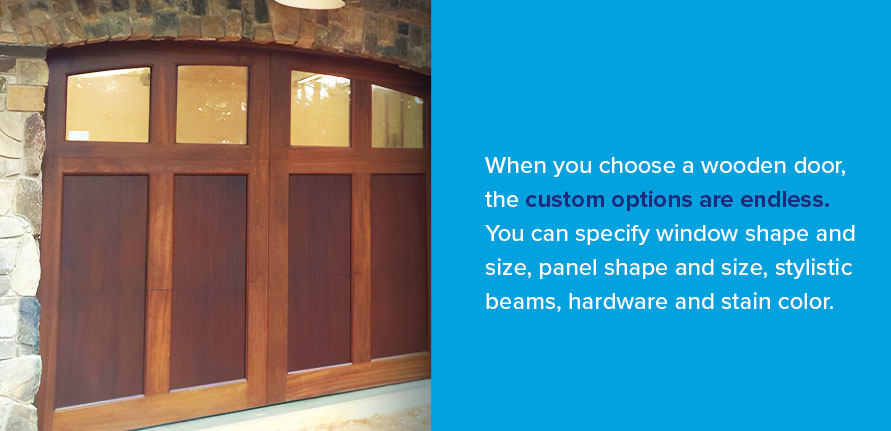
The two winning factors for steel garage doors are their affordability and low maintenance requirements. Steel doors can last a long time with minimal care, and they have a wide range of finish and pattern options.
Some homeowners choose a faux wood overlay so their steel doors have the appearance of a wood finish. This kind of door’s wide range of colors and finishes means you can easily match it to your home and exterior aesthetic.
For all their benefits, however, there are a few cons to selecting a steel garage door. Some of these cons include:
- Low insulation quality (when the door is only one-layer steel)
- Potential for dents
- Possible rust damage
If the finish on your steel doors gets damaged, you’ll need to fix it before rust can set in. Steel might also not be the best option if you have kids who play in your driveway since it does dent. A steel garage door alone can easily conduct cold and heat. Steel garage doors are available with a range of insulation options like polystyrene and polyurethane which can help insulate your garage extremely well.
How to Choose Which Garage Doors Are Best for Your Home
At this point, deciding between metal vs. wood garage doors may be easy for you. However, if you like both options and aren’t sure which one is best, keep reading. We’ll go into a detailed comparison between wood and steel garage doors so you can choose the best option for your home.
Cost
Steel is the best choice if you’d like to buy a garage door on a budget. Steel garage doors can cost less than $1,000, while wood garage doors typically cost several thousand. For a highly customized wood garage door, the total cost could be much higher — $4,000 or more, depending on your location, preferences and the size of your garage. However, custom doors are more expensive for both wood and steel options.
Before deciding against wood garage doors based on cost, talk to a local representative to determine specific pricing for your area. You might also be able to opt for a wood composite that’s more affordable but has the kind of style you prefer.
Style
Which style appeals most to you? Which one would work best with your home? Wood garage doors often work well with traditional houses. You can also consider your home’s exterior and whether a wood garage door would work well with existing decor.
Although many people prefer the look of wood garage doors, steel doors come with a wide range of options and can also elevate your home. Modern homes may be a better fit for steel doors, but they can also be aesthetically pleasing for farmhouse-style homes.
To decide which option would work best with your home’s style, look at examples of different homes. Think about what style your home already promotes and how a new garage door could change or enhance that look.
Maintenance
Both wood and steel garage doors can last for a long time. However, wood garage doors typically take more maintenance — they may need to be resealed several times over the years, and they don’t handle weather changes as well as steel doors.
When you invest in steel garage doors, there’s very little you have to do to maintain them. However, they can be dented with enough force and may develop a rust problem if the finish gets damaged. On the whole, steel garage doors require minimal maintenance.
While part of your investment is financial, another part has to do with time. Long-term maintenance is the responsibility you’re committing to when you purchase a new garage door. Think through how much time you want to spend maintaining this part of your home.
Talk to Garage Door Specialists, Inc. Today!
At Garage Door Specialists, we offer competitive pricing for residential garage doors. Our technicians are trained to repair old garage doors and install new ones.
We carry many Clopay® garage doors, including wood, steel and composite options. Reach out to one of our representatives today for a free estimate or to discuss the best garage door style option for your home. We’re excited to work with you!
Seasonal Garage Door Maintenance Guide
Seasonal Garage Door Maintenance Guide

Year-round maintenance is a must for garage doors because each season presents different challenges. Following the right maintenance routine for the season can keep your door and its components in working order. Follow our seasonal garage door maintenance schedule to know which maintenance and repair tasks to do throughout the year.
Benefits of Regular Garage Door Maintenance
Maintaining a garage door offers several advantages for homeowners. Learning how to maintain a garage door can:
- Save you money since fixing minor repairs is more affordable than a total door replacement.
- Keep your garage door components operational.
- Increase the life span of your garage door and its parts.
- Maintain the structural integrity of your garage.
- Enhance security by preventing access to your home.
- Prevent damage to your vehicle and other belongings.
- Keep you and your family safe from garage door hazards like broken springs.
Garage Door Maintenance Tips by Season
As the seasons change, the way you maintain your garage door should change too. Follow this schedule for garage door maintenance throughout the year.
Spring
After the cold weather, it’s time for spring cleaning — and that should include your garage door. Cleaning your garage door removes the salt, dirt and other debris accumulated over the winter. Wash your garage door with a mild cleaning agent like a detergent or soap. You can clean fiberglass doors with an all-purpose cleaner. Don’t use a pressure washer because it can damage the door surface. Dry the door with a microfiber cloth.
As you’re cleaning the door, take the time to look for damage to the door surface. Steel doors can get rust spots, which you can repair by sanding, priming and painting the area. Wooden doors can warp or have water damage.
Summer
The summer is a great time to check your garage door hardware and the door surface. A summer garage door maintenance routine should involve these areas:
- Garage door structure: Check the garage door for loose or missing parts or rust. Remove the rust and apply a primer to prevent spreading.
- Garage door finish: If your door has peeling paint, take advantage of the pleasant weather to apply a fresh coat of stain or paint. Remove chipped or peeled areas, sand them and apply the stain or paint. Make sure the weather is low humidity with no chance of rain to let the new coat dry properly.
- Hardware: Inspect the door hardware for loose, rusted or missing parts.
- Insulation: Replace damaged or missing insulation immediately to keep the summer heat out of your garage.
- Photo eye: Use a soft cloth to remove debris from the photo eye. Test its function by waving an object in front of the eye while the door is in motion — the garage door should stop immediately.
- Emergency reverse: Test the emergency reverse function by placing an object like a paper towel roll under the garage door. The door should reverse when it reaches the object when trying to close.
Fall
Autumn garage door maintenance focuses on preparing your door for the harsh winter weather. After your summertime inspection, do another inspection in the fall to check these areas:
- Balance: The door’s position should be balanced to prevent excessive wear to the garage door opener. The door may be unbalanced if the door jerks when halfway opened.
- Roller tracks: Lubricate rollers with high-grade spray lubricant and white lithium grease to make the garage door’s motion smooth and reduce tension between the door and rollers.
- Cables and pulleys: The cables and pulleys support the garage door in motion, so inspect them for fraying strands and other damage to keep your garage door operation safe.
- Weatherstripping: The garage door weatherstripping should have no gaps or cracks. Intact weatherstripping keeps your home energy efficient and prevents animals from entering your garage.
- Hardware: Tighten the nuts and bolts on the garage door track to prevent operational issues.
In addition to these areas, inspect the repairs you made in the summer to make sure they’re intact.
Winter
Winter weather can test your garage door’s performance and strength. A thorough maintenance routine during the rest of the year can prevent issues in the winter, like the door getting stuck.
After snowfall, clear the snow and ice away from the door threshold. Ice can make the weatherstripping stick to the garage floor and cause the opener mechanism to have to work harder than normal to open the door, increasing wear and tear.
Common Questions About Garage Door Maintenance
Here are answers to some of the most frequently asked questions about seasonal garage door maintenance:
How Often Do Garage Doors Need Maintenance?
You should have your garage door serviced by a professional at least once a year, even if no issues are present. Preventive maintenance makes your garage door last longer and prevents major operational issues down the road. Your seasonal inspections will help you notice any changes and allow a professional to fix your garage door faster.
Is Do-It-Yourself Garage Door Maintenance Safe?
Some aspects of maintaining your garage door are safe to do on your own, such as repairing rust spots or applying a new coat of paint. However, a professional should handle any concerns with your door’s moving components. Garage door technicians have the tools, parts and experience to make these repairs safely.
Who Can Do Seasonal Garage Door Maintenance?
A garage door repair professional like Garage Door Specialists, Inc. will help you with any installation or maintenance needs. We have provided quality garage door services for the western North Carolina area since 1976.
When you contact us for seasonal maintenance, our professional technicians will bring the appropriate tools and expertise to get the job done. We can easily identify the cause of garage door malfunctions and make the repairs needed right away.
Contact Garage Door Specialists, Inc. to Maintain Your Garage Door Year-Round
Maintain your garage door in any season with the team at Garage Door Specialists, Inc. Our family-owned company offers a variety of garage door services to keep your family safe. Schedule your service with us today to get started!
Common Garage Door Overheating Problems
Common Garage Door Overheating Problems
If you have an automatic garage door, you may run into occasional issues with its performance. You can solve most automatic garage door issues with a quick fix at home, but others may require professional attention. One worry many homeowners have with their garage doors is whether components can overheat, especially during the summer months.
Read our answer to this concern below to learn more about garage door overheating and what you can do to prevent it.
Can My Garage Door Overheat?
Just like any electronic device, your garage door can overheat. This scenario is particularly common in hot weather, especially if you’re opening and closing your garage door frequently within a short period. When you excessively operate your automatic garage door, the opener mechanisms can become overworked and begin to emit heat very quickly.
The two most common reasons for garage door overheating are overuse and problems with the door’s mechanisms. Finding the root of the issue as soon as possible is critical for the longevity of your garage door opener system.
Can My Garage Door Motor Overheat?
Too much use, especially in hot weather, can cause garage door motor overheating. In fact, the motor will automatically shut itself down when the garage door gets too hot. If you try to remotely open your garage door with no success, an overheating opener motor could be the culprit.
Garage door motors occasionally stop working for several reasons. However, if you’ve been using your garage door frequently within a short period, it’s summer or a combination of both, your garage door motor needs to cool down before you can use it again. We recommend waiting 20-30 minutes before attempting to open it again in this scenario.
Can My Garage Door Opener Overheat?
Since the garage door motor is part of the opener itself, then yes — garage door opener overheating is possible. Most garage doors have automatic thermal overload features, which will cease the opener’s operation if the motor gets overheated. This safety feature is the primary way you can tell whether your residential garage door opener is overheated from frequent use.
If you have a serious technical problem with your garage door opener that causes it to overheat, you may see smoke. When this happens, it’s important to shut your garage door opener system down and unplug it immediately before contacting a garage door professional to inspect the problem. Even if your garage door still functions after the opener cools, the motor has already been damaged beyond safe use.
How to Prevent Your Garage Door From Overheating
The simplest way to prevent your residential garage door from overheating is to limit the frequency of use during warmer months. For example, try not to operate your garage door more than once within 15 minutes during the summer. Running the garage door motor more than a few times within an hour can result in overheating.
When you suspect that your garage door is overheating, refrain from using it for at least 20 minutes — longer if your garage is especially hot. If you see smoke coming from the opener or your garage door still won’t open after a significant amount of time has passed, you need to call a garage door professional who can diagnose the issue and make necessary repairs.
What if your door doesn’t work when it’s hot outside?
When the weather gets hot, the metal on the bracket and rails expands in a way such that the safety sensors become misaligned. We recommend applying a heat-resistant lubricant to your garage door brackets in order to help them align.
What if Your Garage Door Opener is Smoking?
If your garage door opener has started to smoke it means you most likely have a blown starting capacitor. When you energize the motor by activating your garage, power flows to the starting capacitor and builds up enough charge to supply the torque to open the door. If you see smoke this means your capacitor has malfunctioned and needs to be replaced immediately.
Contact Us Today for Garage Door Repair in North Carolina
If you’re experiencing garage door opener problems, contact the professionals at Garage Door Specialists, Inc. today. Our experienced team in Western North Carolina will ensure we fix any problems promptly so you can get back to your daily life.


